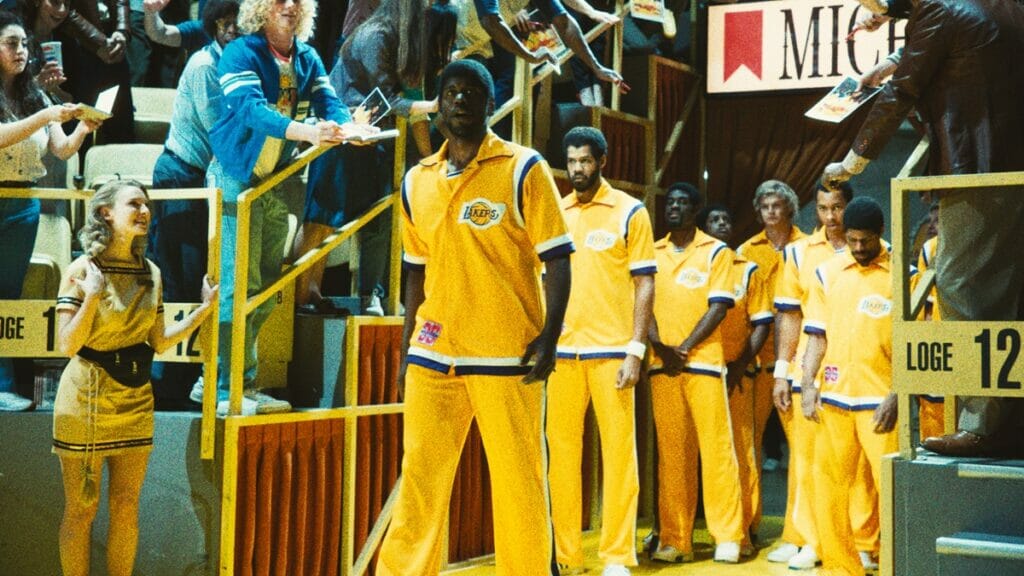MAX’s fictionalized look at basketball history gains some depth, but the filmcraft continues to distract and overwhelm the content.
This piece was written during the 2023 WGA and SAG-AFTRA strikes. Without the labor of the writers and actors currently on strike, the series being covered here wouldn’t exist.
There’s no denying Winning Time: The Rise of the Lakers Dynasty remains entertaining in its second season. There’s no denying that its panoply of digital tricks holds the viewer’s attention, whether what’s on-screen is a scrimmage gone awry or a father meeting his child for the first time. But does that mean it’s good?
The question is somewhat facetious. Anyone who watched last year knows the series is chock full of strong actors and interesting storylines. But while Winning Time Season 2 keeps all those advantages, it also inherits Season 1’s biggest drawback: the people behind the camera don’t seem to share that confidence about the final product.

Take, for instance, Paul Westhead’s (Jason Segel) pep-talk about teamwork in the first episode. The speech lets us into who Westhead was as a player and how that informs his approach to coaching. However, it is also him metaphorically signing his own death certificate. As people who know what happened to him in Los Angeles know, and as the show will soon show the rest, Westhead’s philosophy is incompatible with what rising superstar Magic Johnson (Quincy Isaiah) wants. Moreover, a league-wide shift will prove that the Coach no longer fits in the league. In other words, it is good stuff—heartfelt, dramatic, and heavy with foreshadowing.
Alas, the presentation leaves the impression whoever filmed it found it boring and expects the audience will as well. The imagery flips between “normal” digital photography to shaking home video footage and back. It takes on strange angles. Zooms in tight at awkward moments. All the tricks happen in a way that is neither diegetic nor insightful. It is the equivalent of trying to listen to someone tell you an important story about their life while another person just over their shoulder does their best to pull your focus with a series of increasingly distracting juggling tricks. Sure, both things are attention-worthy, but ultimately neither helps the audience enjoy the other.
That’s Winning Time Season 2—and the larger series—in microcosm. It consistently pits story against image, truth against embellishment. Again, it never fails to entertain, but the chaos isn’t conducive to absorption. And there’s so much about the story that’s worth absorbing.
[Winning Time] never fails to entertain, but the chaos isn’t conducive to absorption. And there’s so much about the story that’s worth absorbing.
Trading in both Season 1’s single-season approach and its largely internally turned focus, Winning Time Season 2 instead spreads the action over four seasons. Additionally, it expands its focus to let the show peek deeper into people beyond Johnson and Jerry Buss (John C. Reilly), most notably Larry Bird (Sean Patrick Small), and his relationship with his father. The season also charts Pat Riley’s (Adrien Brody) transition from assistant to arguably the most recognizable coach of the 1980s in any sport and Jeanie Buss (Hadley Robinson) proving he has plenty in common with her father for better and worse.
Thankfully though, the series still gives Isaiah plenty of time and space to bring his insightful depiction of Johnson to the screen. He demonstrates he’s not yet the team general he’ll become while clashing with Kareem Abdul-Jabbar (Solomon Hughes). He suffers with the weight of his mistakes and injuries in private. In both cases, and beyond, Isaiah gives us a look at Magic that feels dead-on without dropping into a chasm of impression. And when he gets to have a little fun, as a smooth-talking, lascivious devil version of himself on Cookie Keely’s (Tamera Tomakili) proverbial shoulder, he’s a charismatic delight

The Lakers-Celtics rivalry, in particular, gives the show an undeniable propulsive energy. The final episode, when focused on the players and the game, is a master class in sports storytelling. However, Winning Time Season 2 can’t seem to stay focused even then. For one, it can’t resist gilding the lily regarding jokes. For example, when the Lakers escape from an angry Celtics crowd, it takes a moment to draw an arrow to the bus company’s name, White. They don’t trust the audience to notice it or to either understand from the crowd’s behavior or know from history that Boston has an ugly history of racism.
At other times, it cuts away to underwhelming made-up soap opera nonsense like Jerry’s fictional legal battle with imaginary mistress Honey (Ari Graynor, great in the series’ worst subplot). Reilly did outstanding work in season 1, but this time out, the show can’t seem to figure out what to do with him. It invents material to keep him in the mix but makes him a distraction, not an addition.
All of that brings us back to the starting question. Winning Time Season 2 is entertaining. It is visually interesting. It has some very compelling thoughts on its mind. And it can’t stop shooting itself in the foot. There’s an excellent show here. The people making it just keep burying it underneath empty bells and whistles. It doesn’t trick the audience into enjoying it. It tricks them into thinking something with substance is actually hollow.
Winning Time: The Rise of the Lakers Dynasty Season 2 picks up the dribble on MAX on August 6.